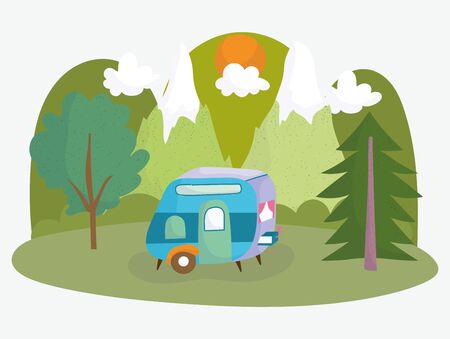Introduction to Group Camping in Britain
Group camping in Britain is an experience that brings families and friends closer together while immersing them in the country’s breathtaking natural landscapes. From the rolling hills of the Lake District to the rugged coastlines of Cornwall and the tranquil woodlands of Scotland, the UK offers a diverse array of settings perfect for group getaways. British group camping is especially popular because it provides an affordable and flexible way to enjoy the great outdoors, allowing groups to bond over shared adventures, campfire stories, and outdoor activities. The unique charm of the British countryside—marked by its ancient forests, picturesque meadows, and historic sites—adds a special flavour to every camping trip. Furthermore, with well-established campsites, access to public footpaths, and a rich tradition of outdoor recreation, Britain makes it easy for groups of all sizes to set up camp and explore. Whether you’re a family seeking quality time or friends looking for adventure, group camping in Britain promises memorable experiences surrounded by nature’s best.
Understanding Leave No Trace Principles
When it comes to group camping in Britain, adopting the Leave No Trace (LNT) principles is crucial for protecting our countryside, parks, and coastlines. These seven guidelines are designed to help families and friends enjoy nature responsibly, ensuring that everyone can continue to experience the beauty of the UK’s wild spaces. Here’s an accessible breakdown of each principle, along with practical examples you’re likely to encounter on British campsites.
The Seven Leave No Trace Principles Explained
| Principle | Explanation | UK Example |
|---|---|---|
| 1. Plan Ahead and Prepare | Research your campsite, weather, and rules before setting out. Bring only what you need and know local guidelines. | Check if wild camping is allowed in the Lake District or Dartmoor, book designated pitches in busy areas like the New Forest, and pack waterproofs for unpredictable weather. |
| 2. Travel and Camp on Durable Ground | Stick to established paths and pitches to avoid damaging fragile grassland or moorland. | Pitch tents on hardstanding or grassy areas provided at sites such as those managed by the Camping and Caravanning Club, avoiding bluebell woods or heather moors. |
| 3. Dispose of Waste Properly | Take all rubbish home or use bins provided. Never leave litter or food scraps behind. | Use recycling facilities at National Trust campsites, bag up used tea bags and crisp packets instead of burying or burning them. |
| 4. Leave What You Find | Preserve the natural environment by not picking flowers, moving rocks, or disturbing wildlife habitats. | Teach children to admire wildflowers without picking them at sites like Pembrokeshire Coast National Park. |
| 5. Minimise Campfire Impact | If fires are allowed, use established fire pits and keep them small. Use camping stoves where possible. | At sites with no fire policy (like many in Scotland), stick to gas stoves; never collect deadwood from ancient woodlands like Epping Forest. |
| 6. Respect Wildlife | Observe animals quietly and never feed them. Keep pets under control at all times. | Keep dogs on leads during lambing season in the Peak District; don’t feed ponies on Exmoor or New Forest commons. |
| 7. Be Considerate of Others | Keep noise down, respect quiet hours, and share communal facilities fairly. | Avoid late-night singing near other campers in Snowdonia; don’t block footpaths with tents or kit at busy coastal campsites in Cornwall. |
Why It Matters for British Group Campers
The unique landscapes of Britain—from rugged Scottish highlands to gentle Cotswold hills—are easily impacted by careless behaviour. By embedding these LNT principles into every group adventure, families and friends can protect natural habitats, support local communities, and ensure future generations have access to clean, welcoming outdoor spaces.
Practical Tips for Everyday Situations
- Packing up: Always do a final ‘litter sweep’ before leaving your pitch—look for micro-litter like tent pegs or bits of foil left from BBQs.
- Campsite etiquette: Greet fellow campers politely but give them space—particularly important on smaller rural sites popular across Wales and northern England.
- Sensitive seasons: During spring nesting or autumn rutting seasons, be extra cautious around wildlife-rich areas such as the Yorkshire Dales or Norfolk Broads.

3. Choosing the Right Campsites and Locations
When planning group camping trips in Britain, selecting the right campsite is vital for both enjoyment and environmental responsibility. Opting for approved or designated campsites is generally the best choice, especially for families and friends travelling together. These sites are specifically managed to handle larger groups and typically provide essential amenities such as toilets, water points, and waste disposal facilities. Many British campsites also have clear guidelines about noise levels, campfire rules, and parking arrangements—helping ensure a positive experience for both campers and nearby residents.
If you’re considering wild camping, it’s important to familiarise yourself with the laws and etiquette that vary across the UK. In England and Wales, wild camping is generally not permitted without landowner permission, except in some parts of Dartmoor National Park (though even here rules are subject to change). Scotland offers more flexibility under its Outdoor Access Code, but campers must still be considerate—pitch your tent away from roads, buildings, and farm animals, and always avoid overcrowding popular beauty spots.
Respect for local communities and environments should underpin every decision. Keep noise to a minimum after dark, avoid blocking access routes or gateways, and support local businesses where possible. Never camp on farmland during lambing or harvest seasons, and steer clear of nature reserves or protected habitats unless clearly allowed. By being selective about where you camp—and following national park guidance—you’ll help preserve Britain’s stunning landscapes for future generations while ensuring your group’s adventure leaves no negative trace.
4. Eco-Friendly Camping Gear and Prep
Choosing the right camping kit is essential for group adventures in Britain—especially if you’re aiming to leave no trace. Opting for sustainable gear not only minimises your environmental impact but also ensures your family or friends are well-prepared for the UK’s famously unpredictable weather.
Eco-Friendly Gear Choices: What’s Available in the UK?
The UK market is full of brilliant eco-friendly camping options. Look for local brands that prioritise sustainability, recycled materials, and ethical production. Here’s a quick guide to help you make greener choices:
| Kit Category | Eco Suggestion | Where to Buy |
|---|---|---|
| Tents | Choose tents made from recycled polyester or with PFC-free coatings | Vango, Alpkit, Decathlon UK |
| Sleeping Bags & Mats | Go for products with recycled filling and fair-trade certification | Rab, Mountain Equipment |
| Cooking Gear | Opt for stainless steel or bamboo utensils, reusable crockery, and gas canisters with recycling schemes | Lakeland, Go Outdoors |
| Lamps & Torches | Select solar-powered or rechargeable models over battery-operated ones | Argos, Cotswold Outdoor |
| Personal Care | Bring biodegradable soap, toothpaste tablets, and reusable wipes | Lush UK, Holland & Barrett |
Packing Tips for British Weather
No one does “four seasons in a day” quite like Britain! Layering is key: pack moisture-wicking base layers, waterproof jackets, and warm mid-layers. Always bring an extra set of clothes for unexpected downpours or mud. Dry bags are invaluable for keeping essentials safe. For group camping, share bulky items like tarps and windbreaks to save space and reduce overall kit weight.
Weather-Ready Packing Essentials:
- Ponchos or lightweight waterproofs for everyone (kids included)
- Reusable shoe covers or wellies—mud is almost guaranteed!
- A compact clothesline for drying wet gear overnight
- Mats or rugs for communal areas to keep things tidy inside tents
- A sturdy communal shelter or gazebo for meal prep and socialising during showers
Sustainable Food Planning: Waste Less, Enjoy More
Feeding a group outdoors can generate unnecessary waste without a bit of planning. Stick to these strategies:
- Create a meal plan before you go—choose dishes that use overlapping ingredients to minimise leftovers.
- Shop at local farm shops or markets en route to support British producers and cut down on packaging.
- Pack dry goods (like oats, pasta, lentils) in reusable containers labelled with portions per person.
- If bringing fresh food, pre-chop veg at home and store them in beeswax wraps or silicone bags instead of cling film.
- Designate a “compost caddy” and a “recycling tub” at camp so everyone knows where waste goes.
- Consider easy one-pot meals: less washing up means less water used and less impact on the environment.
- For snacks, choose bulk trail mix or homemade flapjacks over individually wrapped bars—less rubbish all round!
Packing Pro Tip:
If you’ll be wild camping in remote parts of Britain where disposal facilities are limited, pack out all non-biodegradable waste—and take home any rubbish you find left by others. This helps keep Britain’s wild spaces beautiful for the next group of explorers.
5. Minimising Impact During Your Stay
Responsible Campsite Setup
When group camping in Britain, always use established pitches where possible. Avoid trampling vegetation by sticking to marked paths and designated camping areas. Pitch tents at least 30 metres from lakes or rivers to protect delicate waterside ecosystems. For large groups, spread out your tents in smaller clusters rather than forming one big camp—this helps preserve ground cover and reduces the risk of soil erosion.
Smart Waste Management
The British countryside prides itself on cleanliness, so come prepared with rubbish bags and recycling sacks. Separate your waste: take all rubbish home or use campsite-provided bins responsibly. Never leave food scraps behind, as they attract wildlife and disrupt local ecosystems. Consider bringing reusable containers to minimise single-use plastics and packaging.
Campfires and Smoke-Controlled Areas
Open fires are often discouraged across much of the UK due to fire risk and smoke control regulations. Before lighting any fire, check site rules and local restrictions—many areas only permit raised fire pits or barbecues. Where fires are allowed, use existing fire rings, keep flames small, and never burn plastics or cans. In smoke-controlled zones or during dry spells, opt for camping stoves or battery-powered lanterns instead of open flames for cooking and warmth.
Wildlife Awareness
Britain’s woodlands, moors, and meadows teem with native wildlife. Avoid disturbing animals by keeping noise levels down, especially at dawn and dusk when creatures are most active. Store food securely in sealed containers to deter foxes, badgers, and birds from raiding your supplies. Teach children not to chase or feed wild animals—observing quietly from a distance is both safer and more respectful.
Respect Local Norms
British campers value courtesy: greet neighbours with a friendly “hello,” respect quiet hours (usually after 10pm), and leave communal spaces tidier than you found them. By following these practical Leave No Trace steps rooted in British camping etiquette, your group will help ensure that campsites remain pristine and welcoming for everyone who follows.
6. Activities and Group Bonding Without Harming Nature
Group camping in Britain is about more than just pitching tents—its about creating cherished memories through shared experiences, all while respecting the natural world around us. The key to successful group bonding is to choose activities that are both enjoyable and environmentally friendly, ensuring our beautiful countryside remains unspoilt for future generations.
Classic British Camping Fun
There’s a timeless charm to traditional British camping pastimes. Woodland walks are a favourite—exploring ancient forests or wandering along winding country trails lets everyone connect with nature and each other. Remember to stick to marked paths to avoid disturbing delicate habitats and wildlife. Birdwatching can become an exciting group challenge, with plenty of species unique to the UK waiting to be spotted.
Games That Tread Lightly
Classic outdoor games like rounders, frisbee, or scavenger hunts never go out of style and can be enjoyed with minimal impact. Opt for grassy clearings rather than sensitive areas like wildflower meadows or near water sources. Encourage children and adults alike to respect boundaries—nature comes first, so always check local guidelines before setting up any activity areas.
Exploring Local Heritage
Britains campsites are often surrounded by fascinating heritage sites—think stone circles, Roman ruins, or centuries-old villages. Plan group outings on foot or by bike to explore these treasures sustainably. Many locations offer guided walks or interpretation boards, providing educational opportunities without leaving a mark on the landscape.
Sustainable Socialising
Evenings around the campfire (where permitted) are perfect for storytelling, singalongs, or sharing local legends. Use reusable cups and plates, keep noise levels considerate for wildlife, and always ensure fires are fully extinguished and leave no trace behind. If fires aren’t allowed, gather with lanterns or torches for a magical atmosphere that’s just as memorable.
By choosing thoughtful activities that foster togetherness while prioritising the environment, your group camping experience in Britain will be rewarding for both your party and the planet. Let every adventure inspire a deeper appreciation for our shared wild spaces.
7. Heading Home: Leaving Campsites Better Than You Found Them
As your group camping adventure in Britain draws to a close, it’s essential to ensure you leave the site in an even better state than when you arrived. Practising responsible pack-down not only preserves the natural beauty of our countryside but also sets a shining example for others who come after you. Here’s how to wrap up your stay with true Leave No Trace spirit.
Final Steps for Responsible Pack-Down
Start by assigning roles so everyone is involved in the process. Take down tents and shelters carefully, checking the ground for any tent pegs or bits of string that might have been left behind. Sweep the area for micro-litter—sweet wrappers, bottle caps, and even those tiny corners from food packets. Don’t forget to check under bushes and around logs, as wind can easily move rubbish out of sight.
Essential Leave No Trace Checklist
- Collect all rubbish, even if it isn’t yours.
- Double-check fire pits or BBQ areas—scatter cold ashes and return any stones to their natural place if allowed.
- Brush away footprints or signs of activity on soft ground.
- Fill in any holes or tidy up disturbed earth where tent pegs were placed.
- Ensure no food scraps are left behind, as these attract wildlife and disrupt local ecosystems.
- Check facilities (loos, showers) for cleanliness before you go.
Spreading Leave No Trace Values
As you load up the car and take one last look at your campsite, remind everyone in your group about the positive impact you’ve made by caring for the environment together. Encourage children and newcomers to share what they’ve learned, turning good practice into habit. When you post photos or stories online, highlight your commitment to leaving places pristine—this helps build a wider community of respectful campers across Britain. By modelling these values within your circle and beyond, you ensure that our wild spaces remain welcoming for all future adventurers.
Heading home doesn’t mean leaving your responsibilities behind; rather, it’s about carrying forward the ethos of respect, care, and stewardship wherever your next group camping trip takes you.


